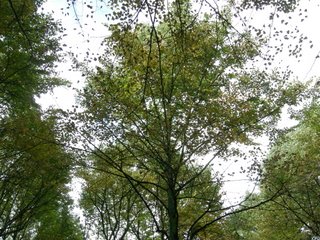
What would happen when you put an Islamic extremist and an fanatic animal rights activist in the same prison cell? The theatre play ‘Volkert van der G. & Mohammed B.’ tries to construct a most unlikely encounter between the two people who committed perhaps the most ground-breaking (political) murders in recent Dutch history.
The 90 minutes dialogue between the murderers of Pim Fortuyn (by Volkert in 2002) and Theo van Gogh (by Mohammed 2004) does not reveal much that people do not already know about the murders. Instead, they reveal the people behind the murders. Volkert shot Pim Fortuyn in the back months before parliamentary elections which could very well have thrust the popular politician into the position of Prime Minister. Fortuyn was a right-wing politician, who was openly homosexual and openly against immigration and what he termed the ‘Islamisation of the
The stage was simple, two old wooden stools and desks, and a worn-out mattress for the two to share. And share the two characters did, pouring out their emotions, motivations and experiences which together help to shape them as self-professed ‘soldiers’ in their individual struggles against what they see as what is terribly wrong with the world today. Not once is the flamboyant politician who or the scruffy filmmaker whose mouth never seems to be without a cigarette mentioned by name. Instead, Volkert refers to his victim as ‘the bald man’ (de kale man), and Mohammed refers to his as ‘the fat man’ (de dikke man). For these are the characteristics of the two national ‘heroes’ which are imprinted in ordinary people’s minds.
While Volkert laments the horrendous tests and experiments that millions of animals have to undergo for the sake of our consumerist society, and rants about the destruction nature to provide for our material wellbeing, Mohammed preaches the decadence of the western society we (and he) live in, warning death and revenge against all who do not believe and who live in a state of godless materialism. Both are driven by obsession, but Mohammed seems convinced of his role as the faceless soldier in Allah’s ‘holy war’, whereas Volkert seems to be more driven by bloodlust and his own insanity. Until this unlikely meeting of two murderers, they only know of each other from what they read in the newspapers. But the meeting brings them together, and brings the audience closer to understanding what it is that unites them.

And the meeting is also a therapeutic anti-climax for both Volkert and Mohammed. Being so alike but also different in many ways, they are able to critically comment on each other’s actions and motivations. Volkert accuses Mohammed, and all extremists, be it in the Islamic, fascist, Christian or Orthodox forms, as closeted homosexuals. What unite these extremists is their disdain of certain groups of people, an intense bias and hatred which feeds on their own sense of inferiority and shame and inability to express their nascent but frustrated sexual desires which they have time and again been told is simply sin. For the religious extremists, the oppression of women, chastising them as objects of desire which need to be subdued and segregated from men, is according to Volkert but another way to reject them because the thought of anything remotely intimate, like touch, or sexual, like intercourse, is repulsive to closeted homosexuals. That’s why women are raped, and often from behind, so that the men with these extremist interpretations of their divine texts do not need to face their shame, and do not need to face the people they’d rather not have sex with. The unflattering remarks go on: monasteries are like ‘dark rooms’, church altars heaven for priests who rape young boys, the back chambres of mosques serve similar functions. Strict religious indoctrination and fanatism seem to be the cause of man’s frustrations, in the way certain natural acts like sex and desire are demonized as deadly sins, and thereby also the cause of man’s ills, in the way that unvented frustrations lead to dehumanising acts of abuse, oppression and suffering.
Provocative remarks and perspectives from a man on the brink of sanity, yes. But it does make you wonder how much truth there is in what he says. Especially the suggestion by Volkert that those who committed the acts of 9-11 were all closeted as well.
Mohammed in return confronts Volkert with his mental illness, saying Volkert has psychological problems because of a deficiency in Vitamin B-12. Volkert never received a life-sentence, but only 18 years, because it could not be argued before the court that he had political motivations, since he was first and foremost an animal rights activist. Mohammed calls Volkert a ‘coward’ for not being able look at his victim in the eye before giving Fortuyn his ‘sentence’. Volkert admitted to the murder, based on the fact that he was convinced Fortuyn was a growing threat to the stability and justice within society, especially for the underprivileged like immigrants and welfare recipients. Mohammed confronts Volkert with the fact that he does not realise that he is himself a soldier of god, and that they have more in common than Volkert would like to deny. Mohammed argues that only with love and compassion can they both be liberated from this world and delivered to utopia. Both are attracted to the notion of suicide, but Mohammed cannot do so unless it is justified in the name of a greater cause. Volkert’s own suicide attempt previously failed, and was rescued by doctors who stopped ‘blood pouring from the pulse’.
The play takes a dramatic turn in the end. Mohammed reveals he stuffed explosives up his rectum. Again Mohammed pleads the case of their salvation, and suggests there is only one way to salvation, a way out of this world that both he and Volkert have been wanting. Mohammed has the hole. Volkert holds the key. They must work together. Love, Mohammed says to Volkert, make love and they can be delivered. They both disappear to the side of the stage. Mohammed tells Volkert to embrace him. Mohammed’s last words was an ultimate cry to his saviour, to the Almighty, to the All-Seeing, the All-Knowing.
‘Oh God’, he cries out, in a voice full of satisfaction and lust.
A loud explosion and blinding lights.
Fin.
Click here for pictures of the performance.








No comments:
Post a Comment